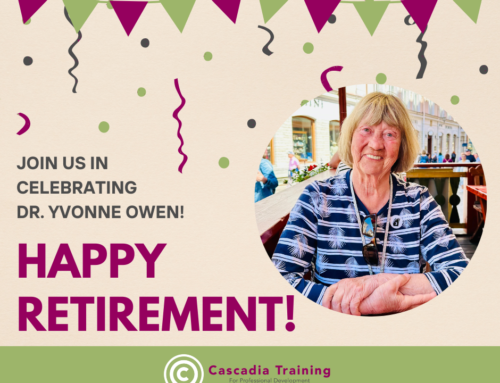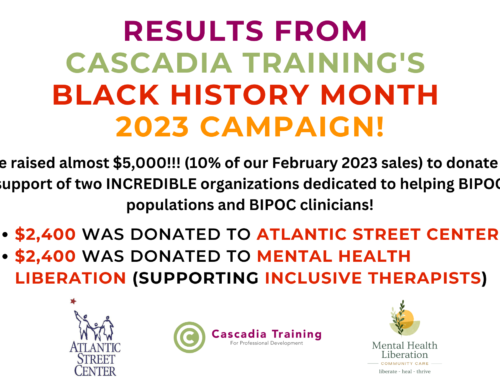Welcome to Cascadia Training’s new blog series highlighting our amazing presenters — The Cascadia Connection!
Our inaugural blog post in this monthly series features long-time and very popular Cascadia instructor, Dr. Brenda S. Butterfield, EdD, MSW, LMHC. Dr. Butterfield has been teaching Cascadia workshops since January 2015.
Before returning to Washington after many years away, Dr. Butterfield was an award-winning faculty member of the Psychology Department at the University of Minnesota Duluth where she was adored by colleagues, the community, and students for her innovative approach to teaching. Upon her return to Washington, Dr. Butterfield needed to renew her mental health license to start her private practice in Washington state. She went where so many people go to earn their continuing education credits, Cascadia!
A teacher by calling, Dr. Butterfield yearned to continue teaching but didn’t feel called to return to academia. A friend and fellow Cascadia participant and presenter suggested she ask Brian Andersen — Cascadia’s beloved owner and operator — if he had any opportunities for her to teach continuing education workshops for Cascadia.
Thinking that she would begin with workshops within realm of expertise — mindfulness, cognitive behavioral therapy, the therapeutic alliance, or such — Dr. Butterfield was a bit taken aback when Brian told her he needed an instructor for Cascadia’s Preparation Training for the National Clinical Mental Health Counseling Exam (NCMHCE). Since she had been out of private practice and in academia for some time, she still needed to take the test again herself!
As she began to prepare to take the exam, she felt called to develop a curriculum along with it. Afterall, she says, “the best way to learn something is to teach it!” In January 2015, she taught her first workshop on the NCMHCE for Cascadia. While she adjusts the curriculum based on participant feedback, most of the curriculum she developed back then still works in these workshops she continues to teach today.
Her approach to teaching is to provide a memorable experience (the best possible experience) for participants as possible and finding innovative ways to evoke deep learning and build synergy among her, her participants, and the material. Her workshops are highly interactive, connecting the participants with both the material and their peers to share and learn from not only her and the material but from each other as well. Dr. Butterfield’s workshops call on her participants to dig deep within themselves, using techniques that invite introspection that lead to deep, integral, and fun learning designed to improve mental health services.
Her dynamic teaching approaches ultimately lead to lasting change among the participants and their work. As Dr. Butterfield says, “What is learning if not change? Learning invites us to change what we think, how we think, our beliefs, and ultimately change our behavior.”
This is also how she develops new workshops. As she learns about new techniques, practices, research, and approaches in her clinical practice and her personal life — her whole lived experience — she feels called to share what she learns with others to (ultimately help) improve (the) mental health (field) care in Washington state and the Pacific Northwest. One such example of this is her hugely popular Essential-Self Care workshop. She developed this workshop after personally experiencing the mental healthcare system as a client in Washington state when her own daughter was navigating the system with her own mental health conditions.
Dr. Butterfield realized that she wasn’t fully showing up for her daughter — or her clients or students — because she wasn’t taking very good care of herself. The popularity of her essential-self care workshop speaks to the fact that many helping professionals are often so busy taking care of other people that they neglect their own needs, which leads to burn out and dissatisfaction in work and life and decreases the quality of the therapeutic alliance. Dr. Butterfield points out that current research suggests there is a correlation between the health and wellbeing of the therapist (mental health professionals are trained in how to care for their whole selves, positive) and treatment outcomes for clients. Self-care is essential for clinicians and supports treatment outcomes for clients.
Another example of how her lived experience leads to new endeavors and workshops is her recent opening of the ONE Center in Olympia. She wasn’t looking to open a new center dedicated to the health and wellness of healthcare professionals and was surprised when the vision emerged to develop one. She felt the calling when she happened upon the perfect waterfront five-acre property in Olympia. The grand opening for the new ONE Center is scheduled for May 2020 but she’s already facilitating workshops there and they are selling out. Currently providing services in both Redmond and Olympia, Dr. Butterfield offers professional development trainings, teaches Mindfulness-Based Stress Reduction and Mindful Self Compassion classes, leads meditation retreats, provides clinical supervision, consulting and counseling for therapists, and most recently has started offering Guided Forest Therapy Walks at the new ONE Center. Increasingly, her focus is on supporting, teaching and guiding health care professionals.
While Dr. Butterfield believes it is important to her that what she is teaching and practicing is evidence-based. In her practice or personal life, when a question, issue, or concern keeps bubbling up, she feels called to look into it, research it, and then teach it. She is committed to improving mental healthcare in Washington state, saying, “instead of just complaining about it, what can I don’t want to complain about it, I want to help make a difference.”
And make a difference she does. Her workshops continually get overwhelmingly positive reviews. One participant who had only been taking online workshops for her continuing education credits for years attended one of Dr. Butterfield’s workshops, and told her after the workshop, “I’m never taking another online workshop again! I learned this material so much more than just memorizing the content for the quiz at the end.”
One of her favorite things about teaching? Being what she calls a “guide by the side, helping support the full development of human potential.” Being a “guide by the side, not a sage on the stage” allows her to show up being who she’s here to BE, her Essential-Self.
If she could change one thing about the state of mental healthcare in Washington? Raise the age that adolescents can start making their own decisions about mental healthcare. Right now, the age is only 13, the youngest in the nation. Dr. Butterfield would like to see Washington raise the age to at least 16 as the outcomes of such young adolescents making their own decisions about their mental healthcare has had dire outcomes.
When Dr. Butterfield isn’t busy helping other helping professionals in her private practice, teaching workshops at Cascadia, or leading workshops at her ONE locations, she practices self-care by seeking solitude sea kayaking among the harbor seals in the Puget Sound and spending time in the forest. Her self-care routines reinvigorate her and give her energy to devote to her family — her 16-year-old son Billy, 21-year-old daughter Gracey (who is also studying to be a mental health professional), and her sweetheart Kirk. And if she wasn’t busy enough, she is also currently training to be a certified forest walking guide!
Check out all of Dr. Butterfield’s upcoming workshops here (and register soon because they all usually sell out fast!) https://cascadia-training.com/instructor/brenda-s-butterfield-edd-msw-lmhc/.






